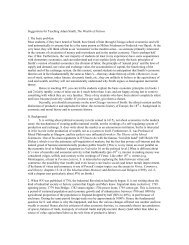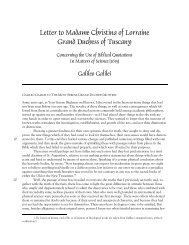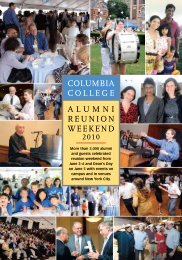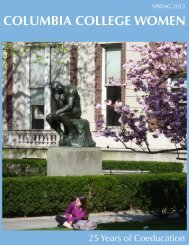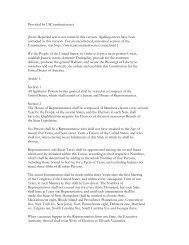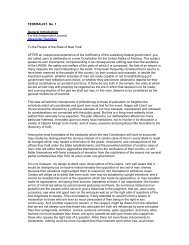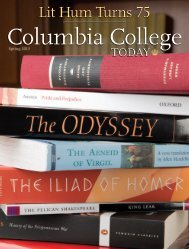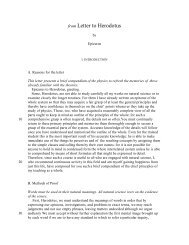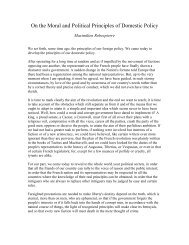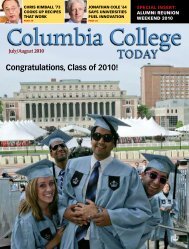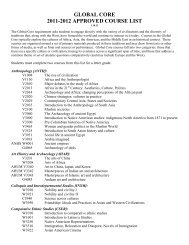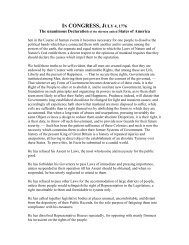Download this issue as a PDF - Columbia College - Columbia ...
Download this issue as a PDF - Columbia College - Columbia ...
Download this issue as a PDF - Columbia College - Columbia ...
Create successful ePaper yourself
Turn your PDF publications into a flip-book with our unique Google optimized e-Paper software.
THE COLLEGE CONNECTION<br />
COLUMBIA COLLEGE TODAY<br />
COLUMBIA COLLEGE TODAY<br />
THE COLLEGE CONNECTION<br />
The Alumni Office additionally puts students in contact with<br />
alumni through events such <strong>as</strong> the Dean’s Scholarship Reception<br />
and the <strong>Columbia</strong> <strong>College</strong> Senior Dessert Reception. The former<br />
gives scholarship recipients and scholarship donors (and/or their<br />
representatives) the chance to meet. Sponsors learn about students’<br />
paths to <strong>Columbia</strong> and lives at the <strong>College</strong> <strong>as</strong> well <strong>as</strong> their plans<br />
for the future; students learn about donors’ experiences <strong>as</strong> undergraduates<br />
and their professional endeavors. The latter, held for the<br />
first time <strong>this</strong> spring, brought seniors together with members of<br />
<strong>Columbia</strong> <strong>College</strong> Young Alumni to learn about the opportunities<br />
to engage with the <strong>Columbia</strong> community after graduation, both in<br />
NYC and through regional and international alumni clubs.<br />
The Alumni Office also collaborates closely with <strong>Columbia</strong><br />
<strong>College</strong> Women, whose mission is to create networks within the<br />
alumnae and student communities while building on the legacy<br />
of women at the <strong>College</strong>. CCW’s flagship activity is its mentoring<br />
program, begun in 1993, which connects alumnae with female<br />
months later, during the send-off reception he hosted with his<br />
wife, Anita Vela-Johnson ’83 Barnard, he made a point of collecting<br />
their email addresses.<br />
“I’d seen and interviewed dozens of students during the l<strong>as</strong>t<br />
14 years but what I hadn’t done w<strong>as</strong> make that connection afterward,”<br />
says Sal<strong>as</strong>, who also is president of the <strong>Columbia</strong> University<br />
Club of San Antonio. “I thought, I don’t want to lose them<br />
anymore — once you’re admitted, you’re [on your way toward<br />
becoming] an alum, and part of the alumni network — and that’s<br />
something I really want to develop going forward.”<br />
While in NYC in October, Sal<strong>as</strong> gathered the entire group for<br />
dinner at V&T Pizzeria. “They’d never been,” he recalls with a<br />
laugh. “I said, ‘How can you have been here for a semester and<br />
not been’ So I got to introduce them to that. But what I really<br />
wanted to know from them w<strong>as</strong>, ‘How’s it going’”<br />
Kelly Echevarria ’16 and Matthew Sheridan ’16E were among<br />
the seven. “Simon w<strong>as</strong> great at interacting with all of us on an<br />
Addressing more broadly the value of students speaking one<br />
on one with alumni, Sal<strong>as</strong> says: “When you see an alum who<br />
h<strong>as</strong> been out of <strong>Columbia</strong> for five, 10, however many years, and<br />
they’re successful and they have interesting jobs, you see the possibilities.<br />
Yes, the alumni are emissaries [for the <strong>College</strong>] but it’s<br />
more than that — it’s about showing here’s what life can be. You<br />
can read about people’s accomplishments and that’s great, but<br />
when you meet someone and talk to them, and they’re articulate<br />
and accomplished, the student says, ‘That can be me.’”<br />
Helping students to see a pathway — or rather, to see<br />
many pathways — is a central goal of the career-oriented<br />
programs that take place throughout the year.<br />
These run the spectrum from large-room lectures, to<br />
networking events, to small group dinners. While the backdrop<br />
varies, alumni speakers often hew to the same model: They describe<br />
their careers and the forces that shaped them, illuminate<br />
advertising, newspapers and more.<br />
Off-campus, two dozen students attended a CCE panel discussion<br />
at Bloomberg headquarters in Midtown. Hosted by Janet<br />
Lorin ’95, ’96J, the panelists included journalists John Brecher ’73;<br />
Robert E. Friedman ’69, ’71 GSAS; Jared Sandberg ’90; and Nick<br />
Summers ’05 (all of the panelists but Sandberg are former editorsin-chief<br />
of Spectator). The panelists described their career paths,<br />
stressing the value of a broad liberal arts education for journalists,<br />
then answered students’ questions, staying afterward to chat<br />
more c<strong>as</strong>ually with individual students.<br />
Other destinations for CCE-sponsored site visits included<br />
Bloomingdale’s, the Metropolitan Museum of Art and the headquarters<br />
of Major League B<strong>as</strong>eball.<br />
CCE’s <strong>Columbia</strong> Exploration Externship program, which<br />
matches first-year students with alumni in an array of industries<br />
for a three- to five-day job-shadowing experience during Spring<br />
Break, also took place in March. Among <strong>this</strong> year’s participants<br />
Elliot Sloane ’83 spoke with a group of students at a Dinner & Discussion Series event on March 4.<br />
PHOTO: BRUCE GILBERT<br />
undergraduates in one-on-one matches. This year, there were<br />
175 matches. “The program is not meant for the students to find<br />
a job,” says Michelle Estilo Kaiser ’87, ’97 P&S, co-chair of the<br />
CCW Mentoring Committee, “although that’s first and foremost<br />
on their minds. And certainly the relationship is different for everyone;<br />
there’s chemistry involved. But we hope both parties get<br />
something out of it that’s really valuable, even if it’s just one conversation<br />
that sticks in their mind.”<br />
For some students, relationships with alumni are forged even<br />
before they begin their first year. Through the work of the Alumni<br />
Representative Committee (ARC), many high school seniors<br />
meet alumni during interviews, through welcome receptions for<br />
accepted students or at send-off receptions for those who decide<br />
to attend.<br />
Simon Sal<strong>as</strong> ’79, ’83L, ’83 SIPA, who chairs the San Antonio/<br />
South Tex<strong>as</strong> Valley region for ARC, had a particularly meaningful<br />
experience l<strong>as</strong>t year. Of the eight students who attended his welcome<br />
reception in Spring 2012, seven chose <strong>Columbia</strong>. Several<br />
individual b<strong>as</strong>is <strong>as</strong> well <strong>as</strong> in a group,” Echevarria says. “I could<br />
tell that he w<strong>as</strong> concerned that we were doing OK and getting<br />
through freshman year. He called a few weeks later to check up<br />
and to <strong>as</strong>k about others in the group … and <strong>as</strong>ked us to make sure<br />
they were doing OK. That’s what I really appreciated about him.”<br />
Echevarria continues: “I love having the relationship with him<br />
that I do. If ever I need anything, I can talk to him and he’s always<br />
looking out for us. A lot of things at <strong>Columbia</strong> are stressful and<br />
career-focused and everyone’s looking for alumni relationships<br />
to get a job — but it’s nice to have <strong>this</strong> c<strong>as</strong>ual, general support<br />
relationship, more of a family-type relationship than one that’s<br />
b<strong>as</strong>ed on getting ahead or getting into the job market.”<br />
Sheridan echoes the sentiment: “It w<strong>as</strong> cool to know that he w<strong>as</strong><br />
looking after our well-being, and to be able to tell our friends, ‘Oh,<br />
we’re going to meet ‘our alum.’ They all wished they had someone<br />
like that from their cities. … Simon had given me advice not to sign<br />
up for so many cl<strong>as</strong>ses, which I’d ignored — and then got slammed<br />
and had to drop one. But I w<strong>as</strong> able to tell him, ‘You were right.’<br />
(Left to right) Hooman Mehran ’86, Rick Wolf ’86 and Mark Berman ’86 proudly carry their cl<strong>as</strong>s banner in <strong>this</strong> year’s Alumni Parade of<br />
Cl<strong>as</strong>ses at Cl<strong>as</strong>s Day.<br />
PHOTO: SUSAN COOK<br />
what it means to work in their industry and field questions from<br />
students on matters both professional and personal.<br />
A survey of March and April alone illustrates the variety. The<br />
CSA Talks series welcomed Li Lu ’96, ’96L, ’96 Business, a leader<br />
of the 1989 Tiananmen Square demonstrations and chairman and<br />
founder of Himalaya Capital, and Jodi Kantor ’96, a New York Times<br />
reporter and author of The Obam<strong>as</strong>. The <strong>Columbia</strong> <strong>College</strong> Dinner<br />
& Discussion Series featured Elliot Sloane ’83, founder and CEO of<br />
the communications firm Sloane & Company, and David Feith ’09,<br />
an editor with The Wall Street Journal and chairman of Citizenship<br />
First. And the Dean-in-Residence Dinner and Discussion Program<br />
brought in actress and Barnard theatre professor Rita Pietropinto-<br />
Kitt ’93, ’96 Arts; she spoke about breaking into show business <strong>as</strong><br />
well <strong>as</strong> her experiences with the Tony Award-winning play Next<br />
to Normal, written by her husband, Tom Kitt ’96, and Brian Yorkey<br />
’93. There also w<strong>as</strong> a Media Networking Night, which allowed students<br />
to chat with alumni who work in film, television, marketing,<br />
were Shen Qiu ’16 and Albert Pan ’16, who worked with Venture<br />
for America COO Eileen Lee ’05. (The nonprofit trains and places<br />
top college graduates at start-ups around the country to give them<br />
experience in the world of entrepreneurship.) The l<strong>as</strong>t day of their<br />
externship coincided with an especially big day for VFA — the final<br />
selection of its 2013 fellows — and Qiu and Pan were greeting<br />
candidates, observing group interview sessions and taking photographs.<br />
In the process, they’d read applications of many of the<br />
fellowship candidates, themselves college seniors. Earlier in the<br />
week, the two had, on their own initiative, conducted interviews<br />
with nine of the 10 VFA staff members to learn more about their<br />
backgrounds <strong>as</strong> well <strong>as</strong> their positions with the company.<br />
Reflecting on the externship, Pan says, “I had a lot of uppercl<strong>as</strong>smen<br />
telling me, <strong>this</strong> is what you have to do to get into investment<br />
banking, and I w<strong>as</strong> pretty set to do all the steps. But now it<br />
got me thinking about all the diverse possibilities — like during<br />
my summers I don’t have to intern at a bank … Talking to a lot<br />
SUMMER 2013<br />
26<br />
SUMMER 2013<br />
27



